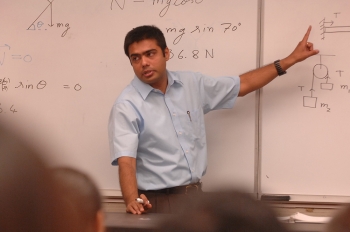
Tirtho Biswas, Assistant Professor of Physics, has been working on gravitational theories for the last several years. While Einstein’s General theory of Relativity reigns supreme when it comes to gravity, it suffers from several obvious defects. For one, it admits solutions which are singular, i.e. they have points in space or time where space-time curvature becomes infinite, signaling a complete breakdown of physical laws. The cosmic beginning, popularly known as the Big Bang, is one such point. Similarly, inside the Black holes one encounters singularities. It is therefore widely believed that Einstein’s theory must be modified at very large energy densities or space-time curvatures. However, finding appropriate modifications turn out to be a highly nontrivial task.
According to Dr. Biswas the problem is that any kind of tampering with Einstein’s theory more often than not leads to the emergence of “ghostly” particles. These particles violate one of the basic tenants of quantum (and classical) physics, that the sum of all probabilities of all possible outcomes in an experiment must be one! Clearly such theories are untenable. Dr. Biswas and his collaborators have recently come up with a procedure to identify “ghost-free” theories of gravity in certain simple background space-times. Moreover, he discovered that there is a rather interesting class of nonlocal models of gravity which are not only ghost-free but also shows great promise in resolving the singularity problems of Einstein’s theory. While Dr. Biswas thinks that this is only a very small step towards the ultimate goal of having a finite theory of gravity, he hopes this is a step in the right direction.
